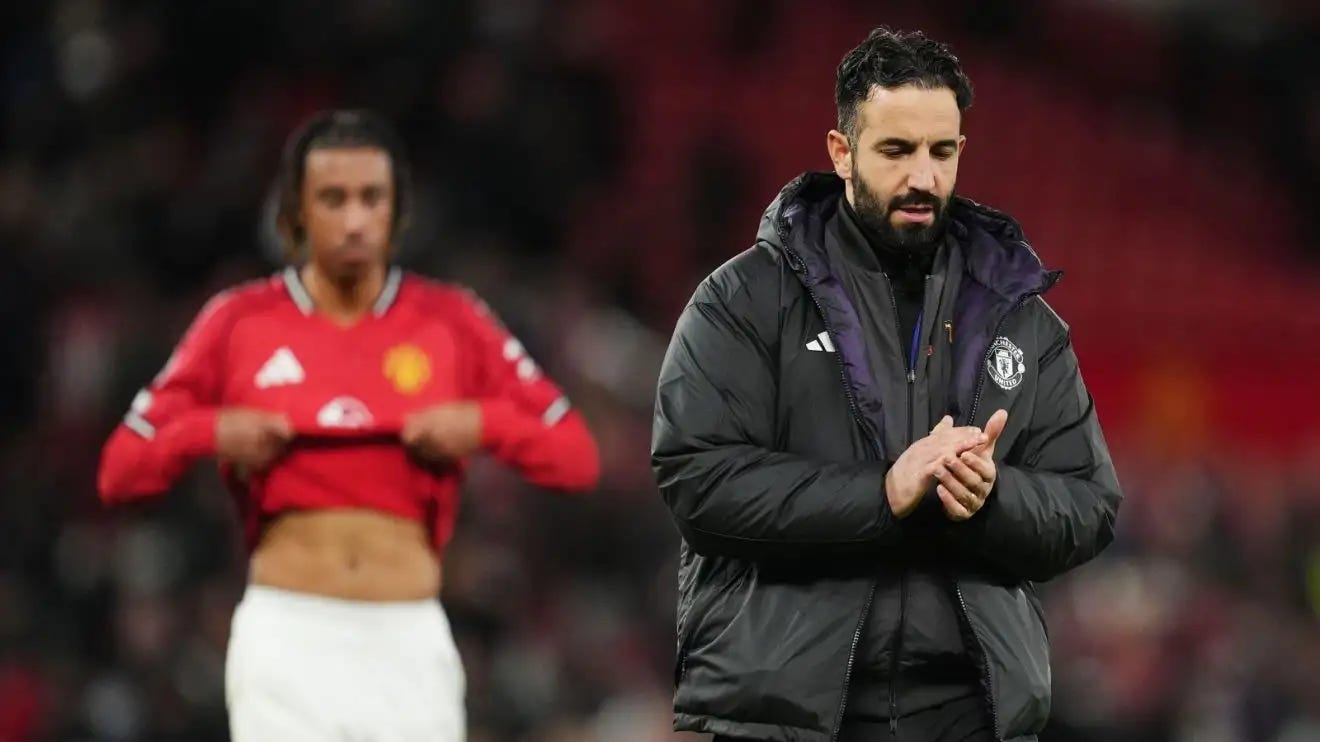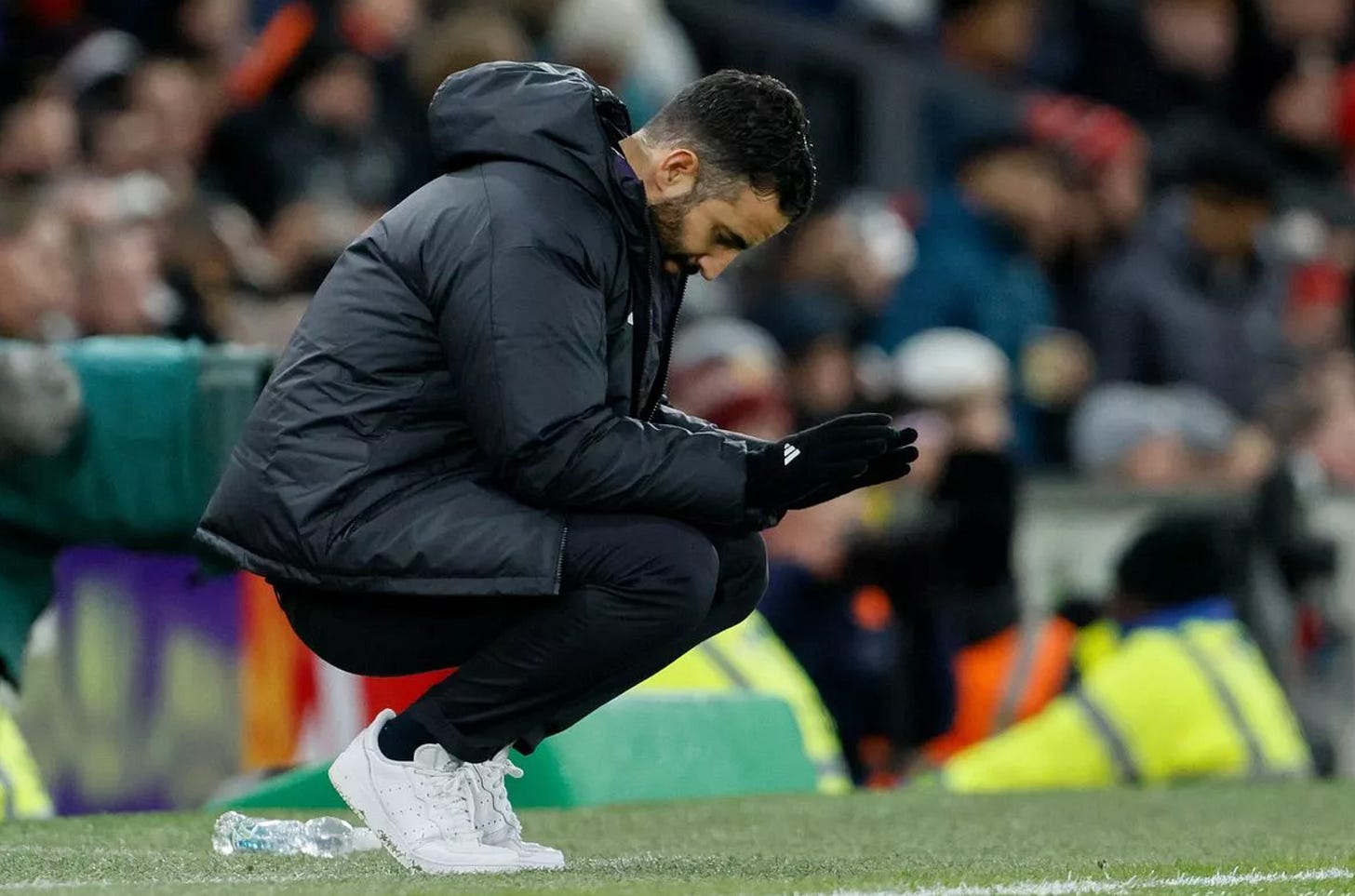Manchester United’s Defeat to 10-Man Everton Exposes a Club Without Direction
Why Everton’s 1-0 Win Exposed Something Deeper
Some defeats sting, and some reveal something far more profound. Manchester United’s loss to Everton, a match that should have been routine, belongs firmly in the second category. Watching United toil for more than seventy minutes against ten men, at home, with the crowd behind them, felt like watching a club trapped within its own fog. It was not just a poor performance; it was a reminder that this is a squad and structure that cannot be trusted to uphold even the basics of top-level football.
As someone with no allegiance to either club, the sight of United’s decline has become oddly familiar. They have reached a stage where poor results surprise nobody, but the manner of this one carried a grim weight. Everton fully deserved their win because they understood the game, its rhythm and its requirements. United looked as if they had arrived without a plan, without urgency and without responsibility.
Culture Without Conviction
Every conversation about Manchester United eventually circles back to culture. It is a word tossed around often, yet so rarely demonstrated. Culture should reveal itself in moments of pressure and opportunity. You would expect a team chasing European qualification, playing at Old Trafford after a two-week break, to begin with vigour. Instead, they drifted through the opening exchanges, misplaced passes, slow reactions, and half-hearted pressing, forming the early pattern.
Even when Everton were reduced to ten men, nothing changed. The dismissal was a gift that should have snapped United into action, yet the only shift was how predictable they became. More than thirty crosses were flung into the area. Most carried no conviction, and even fewer had any sense of intention. It was football by guesswork, a loop of wide play and hopeful deliveries that Everton handled with ease.
You could sense what the home side lacked. Confidence. Composure. Leadership. Awareness. Even with an extra player, decision-making slowed. The moves became more robotic. Playing against ten men offers a kind of liberation. Players step forward. Movements sharpen. The technical quality rises. Instead, everything inside United appeared to tighten. It felt as if the occasion weighed heavier, not lighter.
This is not simply an on-the-day issue. It speaks to a mentality that has festered across several regimes. A team that has forgotten how to take responsibility for moments that demand it. You cannot build resilience by talking about it, you build it by reacting with intelligence when the game demands bravery. None of that was visible here.
System Without Adaptation
Ruben Amorim has a clear preferred structure and has every right to believe in his 3-4-3 shape. Stability is essential for any rebuild. The problem comes when commitment becomes rigidity. Football matches often tilt in unexpected ways, and managers at the highest level adjust accordingly. This situation demanded that kind of switch.
Everton’s red card removed the threat of transitions and placed the burden of invention squarely on United. It was a moment that called for an extra body in central attacking areas, yet the three centre-backs remained on the pitch throughout. The wide channels became a trap, and with every recycled cross the visitors grew more confident.
The more you reviewed the options, the more it highlighted a failure of planning rather than a failure of coaching. United had no natural striker to introduce when the game cried out for presence in the box. Their only true forward, Sesko, was unavailable, and the bench was full of defenders and untested youngsters. Even the summer decisions looked confused. Allowing Rasmus to leave because he might not start every week was always short-sighted. No top club should enter a match without at least two fit centre forwards.
A manager must take responsibility for adhering to a system even when the game requires improvisation. Yet it is fair to note that United’s structural flaws made adaptation difficult. You can only turn to what you have, and what Amorim had was a squad lacking balance, depth in the forward positions, and midfielders capable of unlocking compact defences.
Midfield Without Control
If one area exposed United more than any other, it was midfield. The pairing of Casemiro and Bruno Fernandes has shown time and again that it cannot govern a match built on patience. Both excel when the game is fast. Both thrive when spaces appear. Neither is comfortable facing a packed defensive line.
Everton understood this immediately. They crowded central areas and allowed United’s full-backs to deliver crosses, knowing their centre halves would sweep up. Meanwhile, James Garner looked calm and precise in possession, the kind of midfielder United supporters have long wished for. He dictated tempo, received the ball under pressure and moved his team up the pitch.
Casemiro looked heavy in his legs. Bruno, playing deeper than he suits, struggled to influence phases that required measured build-up. The loss of the ball before the goal summed up his afternoon. A talented player miscast in a role that does not protect his weaknesses or highlight his strengths.
When a team spends most of a match against ten men and still cannot fashion clear openings through the middle, it is not just a question of effort. It is a question of profile. United have spent years avoiding the hard work of building a technical midfield. Without that foundation, they will always struggle against opponents who sit deep and invite them to think.
Identity Without Trust
Looking at this club from the outside, the most striking feature is how little trust it inspires. Not from the fans, who no longer know what version of the team will turn up. Not from the players, who shrink from responsibility whenever the match turns difficult. And not from the structure above the manager, which changes direction with every new appointment.
The pattern is worn out by now. New manager arrives, promises are made, short-term improvement follows, and the first poor result exposes that the underlying problems never went away. You see remnants of old leadership groups, old ideas, old comfort zones. You know a club that adjusts the face but not the identity.
The Everton match did not simply show that United can play poorly. Everyone can. It showed that, even in favourable circumstances, they lack the resourcefulness and drive that elite sides rely on. That is why this defeat carries more weight than the scoreline. It confirms what many have suspected, that United are drifting without the spine required to anchor a proper rebuild.
The reset they require cannot be cosmetic. It needs a clear football identity that survives beyond a manager’s preferences. It needs a leadership group chosen for character rather than seniority. It requires a midfield built for control rather than chaos. And it needs faith in young players who can grow into a system rather than inherit the anxieties of older ones.
None of that will happen quickly. It will require honesty and discomfort. But until there is a willingness to challenge the old guard and reshape the team's spine, matches like this will keep appearing. A club that once set the standard is becoming defined by its inability to match even its own history.
For the rest of the league, especially those of us watching without attachment, the spectacle of a giant stumbling has become part of the Premier League’s landscape. But for a club of United’s stature, this kind of limp surrender should be a warning. You can only talk about potential for so long before results show you exactly what you are.



